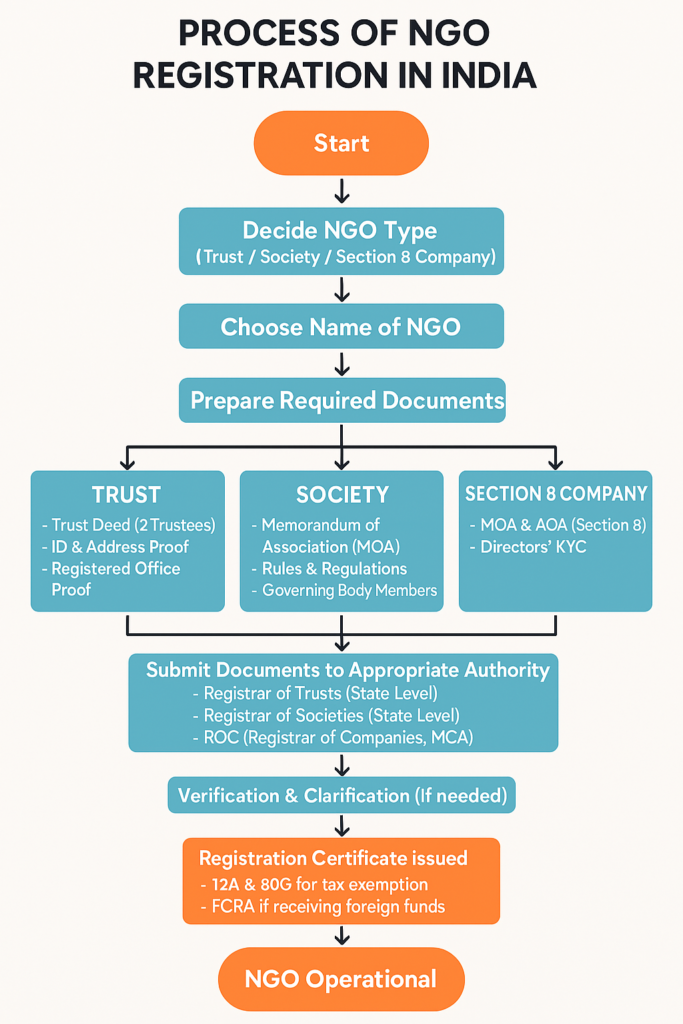NGO Registration
NGO Registration in India.
Non-Governmental Organisation (NGO) registration in India can be done under different legal structures based on objectives. A common form is Society Registration under the Societies Registration Act, 1860, suitable for promoting education, art, social welfare, or charity. It requires a minimum of seven members and is registered with the Registrar of Societies. Another option is Section 8 Company Registration under the Companies Act, 2013, allowing NGOs to function as non-profit companies (private or public) with approval from the Registrar of Companies.
For national and international recognition, NGOs register with the NGO-DARPAN Portal by NITI Aayog, enabling access to government grants and enhancing transparency. An NGO DARPAN ID is essential for legitimacy and funding. NGOs also seek Trademark Registration to protect their name and logo. If their annual turnover exceeds the threshold, GST Registration becomes mandatory.
The organisation is managed by a Governing Body comprising the President, Secretary, and Treasurer. Identity proof, usually an Aadhar Card, is needed for all members during registration. NGOs serving Persons with Disabilities must follow specific regulations to access special government support and schemes.
NGO Registration With Onecall Tax Solution
Role of NGOs in India.
NGOs in India play a vital role in tackling key social challenges such as poverty, education, healthcare, and environmental protection. Functioning independently of the government, they rely on donations, grants, and volunteer efforts to drive their missions and support various initiatives.
Key Roles of NGOs in India:
Advocacy: NGOs influence public policy and promote awareness on pressing social issues like gender equality, human rights, and climate change.
Service Delivery: They offer crucial services such as healthcare camps, educational programs, and disaster relief in underserved areas.
Community Development: By engaging at the grassroots level, NGOs help empower local communities through skill-building, women empowerment, and livelihood programs.
Research and Innovation: NGOs carry out field-based research and develop innovative models to address social issues effectively, which often inform government and institutional practices.
Through these roles, NGOs act as a bridge between the government and society, ensuring inclusive development and social justice.
Who can apply for NGO Registration.
1. Individuals
A single person cannot register an NGO alone, but they can be part of a group that registers one.
For Society: Minimum of 7 members (can be from different states for national-level society).
For Trust: Minimum of 2 trustees, no upper limit.
For Section 8 Company: Minimum of 2 directors for a private company, or 3 for a public one.
2. Groups or Associations
Informal groups with a shared mission can come together to form and register an NGO.
All members must be Indian citizens (foreign nationals can be included with specific permissions depending on the structure).
3. Companies or Existing Organisations
Registered companies or existing NGOs can also form new NGOs or Section 8 Companies for specific projects.
Eligibility:
The objective must be non-profit and aimed at the public good.
Members should be adults (18+ years).
Identity proof like Aadhar, PAN, and address proof is required for all founding members.
Documents required for NGO Registration.
| Document | Details |
|---|---|
| ID Proof of Members | Aadhar Card, PAN Card, Passport, Voter ID, or Driving License of all founders/members. |
| Address Proof | Utility bill, rent agreement, or property ownership document for the registered office. |
| Photographs | Passport-sized photos of all members. |
| Memorandum of Association (MoA) | Defines the NGO’s objectives and activities. |
| Rules & Regulations / Bye-laws | Structure, duties of members, meeting procedures, etc. |
| Signature Specimens | Of all governing body members. |
Process of NGO Registration in India.

FAQs on NGO Registration.
The main purpose of a non-governmental organisation (NGO) is to address social, environmental, or political issues that are not effectively handled by governments or for-profit entities. NGOs aim to promote human rights, deliver humanitarian assistance, support sustainable development, and advocate for policy reforms. They work to uplift marginalized communities, raise awareness, and bring about positive societal change through independent, non-profit initiatives.
Choose the type of NGO based on your objectives and area of operation. Each structure has different legal and compliance requirements. It's advisable to consult a professional to understand the best fit for your organisation.
NGOs in India are eligible for various tax benefits under the Income Tax Act, 1961. Registration under Section 12A allows NGOs to claim tax exemption on their income, while Section 80G enables donors to receive tax deductions on donations made to the NGO. Additionally, NGOs involved in charitable or religious activities may be exempt from GST on certain services they provide.
The minimum number of members required to form an NGO in India varies by structure: Trust requires at least 3 members, Society needs a minimum of 7 members, and a Section-8 Foundation can be formed with just 2 members.
Yes, government employees or officers can become part of NGOs, but they must follow their department’s rules and may need prior permission to avoid conflicts of interest or violations of service conduct rules.
